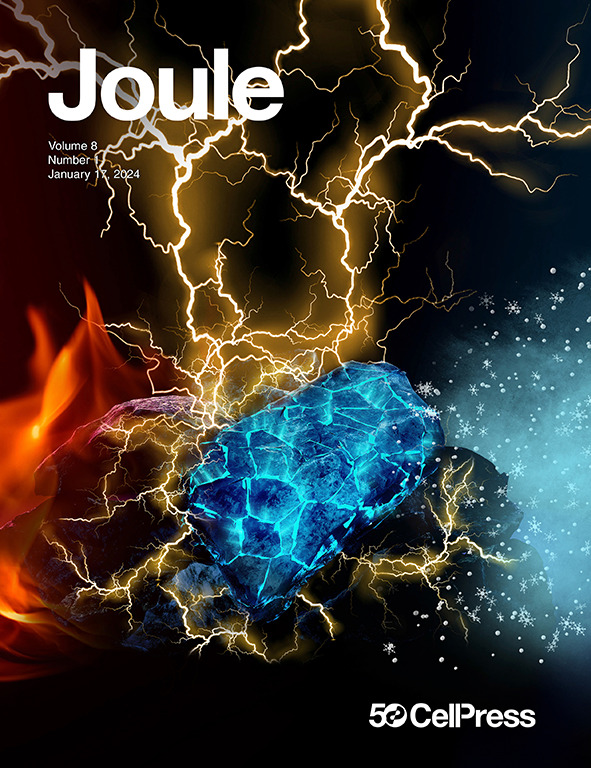热非互易性对辐射冷却效率影响的一个难以忽视的真相
IF 35.4
1区 材料科学
Q1 CHEMISTRY, PHYSICAL
引用次数: 0
摘要
刘梦琪于2016年获得山东大学能源与动力工程学士学位,并于2022年获得上海交通大学和新加坡国立大学工程热物理学联合博士学位。现为上海交通大学博士后研究员,新加坡国立大学访问学者。主要研究方向为微纳米尺度热辐射、非互易热光子学、热光子拓扑特性、超材料能量器件等。毕业于大连理工大学能源与动力工程学院,获学士学位。他目前是上海交通大学工程热物理研究所的博士生。主要研究方向为彩色辐射冷却装置设计、智能窗、电致变色显示、高效动态光谱工程等。周成龙,哈尔滨工程大学能源与动力工程学士学位,哈尔滨工业大学工程热物理硕士学位,哈尔滨工业大学博士学位。之后,他于2024年加入哈尔滨工业大学能源科学与工程系,现任副研究员。他的研究方向是近场辐射传热,旨在解决黑体辐射极限的限制和新能源系统中辐射能量利用的精确调节的挑战。王伯祥,2012年获华中科技大学学士学位,2018年获上海交通大学博士学位。先后在同一所大学任博士后(2018-2021)、副教授(2021-2022)、副教授(2022-2024)。之后加入中国科学院上海微系统与信息技术研究所,任青年教授,热辐射组首席研究员。主要研究方向为纳米热辐射、纳米光子学、微机电系统(MEMS)传感器、智能窗和辐射冷却。赵长英,上海交通大学工程热物理研究所主任,讲座教授。主要研究方向为微纳热辐射与超材料能器件、先进储能与储氢、多孔介质传热等。在同行评议的高质量期刊上发表论文300多篇,总引用次数超过20000次。他的贡献得到了著名奖项的认可,包括2023年威廉贝格尔奖章和2024年杰出研究奖。他是《碳中和》杂志的主编,《热科学与工程进展》杂志的副主编,以及其他几家国际期刊的编委会成员。邱成伟是新加坡国立大学电子与计算机工程系的教务长讲座教授。邱教授是新加坡工程院院士。他也是APS、Optica、SPIE和美国电磁学会的会员。他是中国光学学会外籍会员。2003年获中国科学技术大学工学学士学位,2007年获新加坡国立大学博士学位。之后他在麻省理工学院物理系做博士后。他的研究以多维融合的结构表面、光束操纵和热超材料而闻名。本文章由计算机程序翻译,如有差异,请以英文原文为准。
An inconvenient truth of thermal nonreciprocity’s impact on radiative cooling efficiency
Mengqi Liu received her bachelor’s degree in energy and power engineering from Shandong University in 2016 and a joint PhD degree in engineering thermophysics from Shanghai Jiao Tong University (SJTU) and National University of Singapore (NUS) in 2022. Now, she is a postdoctoral researcher at SJTU and a visiting scholar at NUS. Her research interests include micro/nanoscale thermal radiation, nonreciprocal thermal photonics, topological properties in thermal photoncis, metamaterials energy devices, etc.
Shenghao Jin obtained his bachelor’s degree at the School of Energy and Power Engineering at Dalian University of Technology, China. He is currently a PhD student in the Institute of Engineering Thermophysics at SJTU, China. His research interests include the design of colorful radiative cooling devices, smart windows, electrochromic display, and efficient dynamic spectrum engineering.
Chenglong Zhou obtained his bachelor’s degree in energy and power engineering from Harbin Engineering University, a master’s degree in engineering thermophysics from Harbin Institute of Technology, and a PhD from Harbin Institute of Technology. After that, he joined the Department of Energy Science and Engineering, Harbin Institute of Technology, in 2024, where he is currently working as an associate researcher. He works in the near-field radiative heat transfer, aiming to address the constraints imposed by the blackbody radiation limit and the challenges in precise regulation of radiative energy utilization within novel energy systems.
Boxiang Wang received a BS degree from Huazhong University of Science and Technology in 2012 and then a PhD from SJTU in 2018. Then he worked successively as a postdoctoral researcher (2018–2021), an assistant professor (2021–2022), and then an associate professor (2022–2024) at the same university. After that, he joined Shanghai Institute of Microsystem and Information Technology (SIMIT), Chinese Academy of Sciences, as a young professor and the principal investigator of SIMIT Thermal Radiation Group. His research interests include nanoscale thermal radiation, nanophotonics, micro-electro-mechanical system (MEMS) sensors, smart windows and radiative cooling.
Changying Zhao is the chair professor and the director of the Institute of Engineering Thermophysics of SJTU. His research covers micro/nanoscale thermal radiation and metamaterial energy devices, advanced thermal energy storage and hydrogen storage, and heat transfer in porous media. He has published over 300 papers in peer-reviewed high-quality journals with over 20,000 citations in total. His contributions have been recognized through prestigious awards, including a 2023 William Begell Medal and 2024 Prominent Research Award. He is the editor-in-chief of Carbon Neutrality, an associate editor of Thermal Science and Engineering Progress, and an editorial board member of several other international journals.
Cheng-Wei Qiu is the provost’s chair professor at the Department of Electrical and Computer Engineering of NUS. Prof. Qiu is a fellow of the Academy of Engineering, Singapore. He is also a fellow of APS, Optica, SPIE, and The Electromagnetics Academy, USA. He is foreign fellow of the Chinese Optical Society. He received his B.Eng. degree from University of Science and Technology of China in 2003 and PhD from NUS in 2007. He was a postdoctoral fellow at the Physics Department in MIT thereafter. His research is well known for the structured surface of multi-dimensional fusion, beam manipulation, and thermal metamaterials.
求助全文
通过发布文献求助,成功后即可免费获取论文全文。
去求助
来源期刊

Joule
Energy-General Energy
CiteScore
53.10
自引率
2.00%
发文量
198
期刊介绍:
Joule is a sister journal to Cell that focuses on research, analysis, and ideas related to sustainable energy. It aims to address the global challenge of the need for more sustainable energy solutions. Joule is a forward-looking journal that bridges disciplines and scales of energy research. It connects researchers and analysts working on scientific, technical, economic, policy, and social challenges related to sustainable energy. The journal covers a wide range of energy research, from fundamental laboratory studies on energy conversion and storage to global-level analysis. Joule aims to highlight and amplify the implications, challenges, and opportunities of novel energy research for different groups in the field.
 求助内容:
求助内容: 应助结果提醒方式:
应助结果提醒方式:


